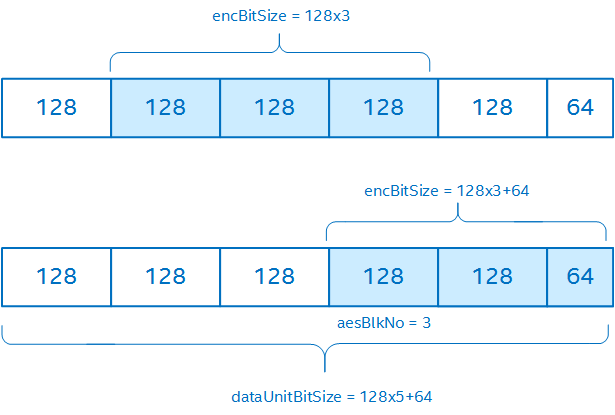Developer Guide and Reference for Intel® Cryptography Primitives Library
A newer version of this document is available. Customers should click here to go to the newest version.
AESEncryptXTS_Direct, AESDecryptXTS_Direct
Encrypts/decrypts a data buffer in the XTS mode.
Syntax
IppStatus ippsAESEncryptXTS_Direct(const Ipp8u* pSrc, Ipp8u* pDst, int encBitSize, int aesBlkNo, const Ipp8u* pTweakPT, const Ipp8u* pKey, int keyBitSize, int dataUnitBitSize);
IppStatus ippsAESDecryptXTS_Direct(const Ipp8u* pSrc, Ipp8u* pDst, int encBitSize, int aesBlkNo, const Ipp8u* pTweakPT, const Ipp8u* pKey, int keyBitSize, int dataUnitBitSize);
Include Files
ippcp.h
Parameters
pSrc |
Pointer to the input (plain- or cipher-text) data buffer. |
pDst |
Pointer to the output (cipher- or plain-text) data buffer. |
encBitSize |
Length of the input data being encrypted or decrypted, in bits. The output data length is equal to the input data length. |
aesBlkNo |
The sequential number of the first plain- or cipher-text block for operation inside the data unit. |
pTweakPT |
Pointer to the little-endian 16-byte array that contains the tweak value assigned to the data unit being encrypted/decrypted. |
pKey |
Pointer to the XTS-AES key. |
keyBitSize |
Size of the XTS-AES key, in bits. |
dataUnitBitSize |
Size of the data unit, in bits. |
Description
These functions encrypt or decrypt the input data according to the XTS-AES mode IEEE P1619 of the AES block cipher. The XTS-AES tweakable block cipher can be used for encryption/decryption of sector-based storage. The XTS-AES algorithm acts on a single data unit or a section within the data unit and uses AES as the internal cipher. The length of the data unit must be 128 bits or more. The data unit is considered as partitioned into m+1 blocks:
T = T[0] | T[1] | … |T[m-2] | T[m-1] |T[m]
where
m = ceil(dataUnitBitLen/128)
the first m blocks T[0], T[1], …,T[m-1] areexactly 128 bits long
the last block T[m] is between 0 and 127 bits long(it could be empty, for example, 0 bits long)
The cipher processes the first (m-1) blocks T[0], T[1], …, T[m-2] independently of each other. If the last block T[m]is empty, then the block T[m-1] is processed independently too. However, if the last block T[m]is not empty, the cipher processes the blocks T[m-1] and T[m] together using a ciphertextstealing mechanism. See IEEE P1619 for details.
With the Intel® Cryptography Primitives Library implementation of XTS-AES, you can select a sequence of adjacent data blocks (section) within the data unit for processing. The section you select is specified by the aesBlkNo and encBitSize parameters.
The ciphertext stealing mechanism constrains possible section selections. If the last block T[m] of the data unit is not empty, the section you select must contain either bothT[m-1] and T[m] or neither of them. Therefore, consider encBitSize, aesBlkNo, and dataUnitBitSize all together when making a function call. The following figure shows valid selections of a section within the data unit:

The XTS-AES block cipher uses tweak values to ensure that each data unit is processed differently. A tweak value is a 128-bit integer that represents the logical position of the data unit. The tweak values are assigned to the data units consecutively, starting from an arbitrary non-negative integer. Before calling the function, convert the tweak value into a 16-byte little-endian array. For example, the tweak value 0x123456789A corresponds to the byte array:
Ipp8u twkArray[16] = {0x9A, 0x78, 0x56, 0x34, 0x12, 0x00, 0x00, 0x00,
0x00, 0x00, 0x00, 0x00, 0x00, 0x00, 0x00, 0x00}.The key for XTS-AES is parsed as a concatenation of two fields of equal size, called data key and tweak key, so that key = data key|tweakkey.
where
data key is used for data encryption/decryption
tweak key is used for encryption of the tweak value
The standard allows only AES128 and AES256keys.
Refer to IEEE P1619 for more details.
Return Values
ippStsNoErr |
Indicates no error. Any other value indicates an error or warning. |
ippStsNullPtrErr |
Indicates an error when any of the specified pointers is NULL. |
ippsStsLengthErr |
Indicates an error condition when: dataUnitBitsize < 128 or keyBitsize != 256 or 512 |
ippStsBadArgErr |
aesBlkNo >= dataUnitBitsize/IPP_AES_BLOCK_BITSIZE or aesBlkNo < 0 |
ippsStsBadArgErr |
Indicates an error when: |